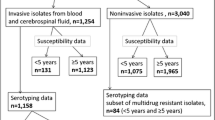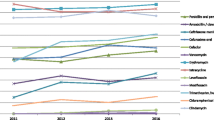Abstract
This study was performed to evaluate the clinical features of community-onset levofloxacin-nonsusceptible pneumococcal pneumonia and to identify risk factors for levofloxacin resistance. Using the database of a surveillance study of community-acquired pneumococcal infections in Asian countries, we conducted a nested case–control study to identify risk factors for levofloxacin-nonsusceptible S. pneumoniae in community-acquired pneumonia in adults. Of 981 patients with pneumococcal pneumonia, 46 (4.7 %) had levofloxacin-nonsusceptible S. pneumoniae, of whom 39 evaluable cases were included in the analysis. All cases were from Korea, Taiwan, and Hong Kong. Among patients with levofloxacin-susceptible S. pneumoniae, 490 controls were selected based on patient country. Of the 39 cases of levofloxacin-nonsusceptible pneumococcal pneumonia, 23 (59.0 %) were classified as healthcare-associated, while 164 (33.5 %) of the 490 controls of levofloxacin-susceptible S. pneumoniae (P = 0.001) were classified as healthcare-associated. Multivariate analysis showed that previous treatment with fluoroquinolones, cerebrovascular disease, and healthcare-associated infection were significantly associated with levofloxacin-nonsusceptible pneumococcal pneumonia (all P < 0.05). Levofloxacin-nonsusceptible pneumococci pose an important new public health threat in our region, and more information on the emergence and spread of these resistant strains will be necessary to prevent spread throughout the population.
Similar content being viewed by others
References
Kim SH, Song JH, Chung DR, Thamlikitkul V, Yang Y, Wang H, Lu M, So TM, Hsueh PR, Yasin RM, Carlos CC, Pham HV, Lalitha MK, Shimono N, Perera J, Shibl AM, Baek JY, Kang CI, Ko KS, Peck KR (2012) Changing trends in antimicrobial resistance and serotypes of Streptococcus pneumoniae isolates in Asian countries: an Asian Network for Surveillance of Resistant Pathogens (ANSORP) study. Antimicrob Agents Chemother 56:1418–1426
Song JH, Jung SI, Ki HK, Shin MH, Ko KS, Son JS, Chang HH, Kim SW, Lee H, Kim YS, Oh WS, Peck KR, Chongthaleong A, Lalitha MK, Perera J, Yee TT, Jamal F, Kamarulzaman A, Carlos CC, So T (2004) Clinical outcomes of pneumococcal pneumonia caused by antibiotic-resistant strains in Asian countries: a study by the Asian Network for Surveillance of Resistant Pathogens. Clin Infect Dis 38:1570–1578
Low DE (2004) Quinolone resistance among pneumococci: therapeutic and diagnostic implications. Clin Infect Dis 38 [Suppl 4]:S357–S362
Orr D, Wilkinson P, Moyce L, Martin S, George R, Pichon B (2010) Incidence and epidemiology of levofloxacin resistance in Streptococcus pneumoniae: experience from a tertiary referral hospital in England. J Antimicrob Chemother 65:449–452
Pletz MW, McGee L, Jorgensen J, Beall B, Facklam RR, Whitney CG, Klugman KP (2004) Levofloxacin-resistant invasive Streptococcus pneumoniae in the United States: evidence for clonal spread and the impact of conjugate pneumococcal vaccine. Antimicrob Agents Chemother 48:3491–3497
Rodriguez-Avial I, Ramos B, Rios E, Cercenado E, Ordobas M, Sanz JC (2011) Clonal spread of levofloxacin-resistant Streptococcus pneumoniae invasive isolates in Madrid, Spain, 2007 to 2009. Antimicrob Agents Chemother 55:2469–2471
Friedman ND, Kaye KS, Stout JE, McGarry SA, Trivette SL, Briggs JP, Lamm W, Clark C, MacFarquhar J, Walton AL, Reller LB, Sexton DJ (2002) Health care-associated bloodstream infections in adults: a reason to change the accepted definition of community-acquired infections. Ann Intern Med 137:791–797
Kollef MH, Morrow LE, Baughman RP, Craven DE, McGowan JE Jr, Micek ST, Niederman MS, Ost D, Paterson DL, Segreti J (2008) Health care-associated pneumonia (HCAP): a critical appraisal to improve identification, management, and outcomes-proceedings of the HCAP Summit. Clin Infect Dis 46 [Suppl 4]:S296–S334, quiz 335–298
Kang CI, Song JH, Kim SH, Chung DR, Peck KR, Thamlikitkul V, Wang H, So TM, Hsueh PR, Yasin RM, Carlos CC, Van PH, Perera J (2013) Risk factors and pathogenic significance of bacteremic pneumonia in adult patients with community-acquired pneumococcal pneumonia. J Infect 66:34–40
Song JH, Oh WS, Kang CI, Chung DR, Peck KR, Ko KS, Yeom JS, Kim CK, Kim SW, Chang HH, Kim YS, Jung SI, Tong Z, Wang Q, Huang SG, Liu JW, Lalitha MK, Tan BH, Van PH, Carlos CC, So T (2008) Epidemiology and clinical outcomes of community-acquired pneumonia in adult patients in Asian countries: a prospective study by the Asian network for surveillance of resistant pathogens. Int J Antimicrob Agents 31:107–114
Ho PL, Tse WS, Tsang KW, Kwok TK, Ng TK, Cheng VC, Chan RM (2001) Risk factors for acquisition of levofloxacin-resistant Streptococcus pneumoniae: a case-control study. Clin Infect Dis 32:701–707
Jimenez MR, Bellido JL, Garcia Rodriguez JA (2005) Risk factors associated with colonization by pneumococci with reduced susceptibility to fluoroquinolones in adult outpatients. J Clin Microbiol 43:1193–1197
van der Starre WE, van Nieuwkoop C, Paltansing S, van’t Wout JW, Groeneveld GH, Becker MJ, Koster T, Wattel-Louis GH, Delfos NM, Ablij HC, Leyten EM, Blom JW, van Dissel JT (2011) Risk factors for fluoroquinolone-resistant Escherichia coli in adults with community-onset febrile urinary tract infection. J Antimicrob Chemother 66:650–656
Pletz MW, van der Linden M, von Baum H, Duesberg CB, Klugman KP, Welte T (2011) Low prevalence of fluoroquinolone resistant strains and resistance precursor strains in Streptococcus pneumoniae from patients with community-acquired pneumonia despite high fluoroquinolone usage. Int J Med Microbiol 301:53–57
Wolter N, du Plessis M, von Gottberg A, de Gouveia L, Klugman KP (2009) Molecular characterization of emerging non-levofloxacin-susceptible pneumococci isolated from children in South Africa. J Clin Microbiol 47:1319–1324
Eliopoulos GM (2004) Quinolone resistance mechanisms in pneumococci. Clin Infect Dis 38 [Suppl 4]:S350–S356
Kang CI, Song JH, Kim SH, Chung DR, Peck KR, Thamlikitkul V, Wang H, So TM, Hsueh PR, Yasin RM, Carlos CC, Van PH, Perera J (2013) Association of levofloxacin resistance with mortality in adult patients with invasive pneumococcal diseases: a post hoc analysis of a prospective cohort. Infection 41:151–157
Acknowledgements
This study was supported by the Basic Research Program through the National Research Foundation of Korea (NRF), funded by the Ministry of Education, Science, and Technology (No. 2010-0021572). Bacterial isolates were obtained from the Asian Bacterial Bank (ABB) of the Asia Pacific Foundation for Infectious Diseases (APFID). We would like to thank all of the ANSORP study group investigators who participated in this study for their dedication and contribution.
Asian Network for the Surveillance of Resistant Pathogens (ANSORP) study group
Hospitals and investigators participating in the ANSORP study group are as follows: Jae-Hoon Song (Organizer), Doo Ryeon Chung, Kyong Ran Peck, and Cheol-In Kang (Samsung Medical Center, Seoul), Joon-Sup Yeom (Kangbuk Samsung Hospital, Seoul), Hyun Kyun Ki (Konkuk University Hospital, Seoul), Jun Seong Son (Kyunghee University Hospital, Seoul), Yeon-Sook Kim (Chungnam National University Hospital, Daejeon), Ji-Young Rhee (Dankook University Hospital, Cheonan), Sook-In Jung and Kyung Hwa Park (Chonnam National University Hospital, Gwangju), Shin-Woo Kim and Hyun-Ha Chang (Kyungpook National University Hospital, Daegu), Ki Tae Kwon (Daegu Fatima Hospital, Daegu), Hyuck Lee (Dong-A University Hospital, Busan), Chisook Moon (Inje University Busan Paik Hospital, Busan), Sang Yop Shin (Cheju National University Hospital, Jeju), and Sang Taek Heo (Cheju National University Hospital, Jeju) in Korea; Hui Wang (Peking Union Medical College Hospital, Beijing; currently Peking University People’s Hospital, Beijing), Bin Cao and Yingmei Liu (Beijing Chaoyang Hospital, Beijing), Yunjian Hu and Tieyiing Sun (Beijing Hospital, Beijing), Chao Zhuo and Danhong Su (Guangzhou Institute of Respiratory Diseases, Guangzhou), Yunsong Yu and Yang Qing (First Affiliated Hospital of College of Medicine, Zhejiang University, Hangzhou), Rong Zhang (Second Affiliated Hospital of College of Medicine, Zhejiang University, Hangzhou), Ziyong Sun and Shengdao Xiong (Tongji Hospital of Tongji Medical College, Huazhong University of Sciences and Technology, Wuhan), Yong Liu (Shengjing Hospital of China Medical University, Shenyang), Yunzhou Chu, Baiyi Chen, and Xiaochun Ma (The First Hospital China Medical University, Shenyang), Yonghong Yang, Xuzhuang Shen, Sangjie Yu, Kaihu Yao, and Yinghui Hu (Beijing Children’s Hospital Affiliated to Capital Medical University, Beijing), Libo Wang and Chuangqing Wang (Pediatric Hospital of Fudan University, Shanghai), Yuan Chen, Ying Huang and Lan Liu (Chongquing Children’s Hospital, Chongquing), Yuejie Zheng (Shenzhen Children’s Hospital, Shenzhen), and Min Lu, Hong Zhang, and Quan Lu (Shanghai Children’s Hospital, JiaoTong University) in China; Thomas M. K. So and Tak Keung Ng (Princess Margaret Hospital) and Wai-Keung Kwan and Wing-kin To (Yan Chai Hospital) in Hong Kong, Po-Ren Hsueh (National Taiwan University Hospital, Taipei), Cheng-Hsun Chiu and Lin-Hui Su (Chang-Gung Children’s Hospital, Taoyuan), and Yen-Hsu Chen (Chung-ho Memorial Hospital, Kaohsiung) in Taiwan; Visanu Thamlikitkul (Siriraj Hospital, Bangkok) and Anan Chongthaleong (Chulalongkorn University Hospital, Bangkok) in Thailand; Rohani Md Yasin and Norazah Ahmad (Institute for Medical Research, Kuala Lumpur), Adeeba Kamarulzaman, Sasheela Vanar, and Rina Karunakaran (University Malaya Medical Centre, Kuala Lumpur), Dato’ Jeyaindran Sinnadurai, Shanti Rudra Deva, and Mohamad Nazri Aziz (Hospital Kuala Lumpur, Kuala Lumpur), Tan Kah Kee, Suhailah Md Hanapiah, Jaideep Singh Sidhu, and Jenny Tong May Geok (Hospital Seremban, Seremban), Mahiran Mustafa, Nurahan Binti Maning, and Shaiful Azman Zakaria (Hospital Kota Bharu, Kelantan), Christopher Lee, Anuradha a/p, Radhakrishnan, Shanti a/p Ratnam, Zubaidah Abdul Wahab, and Ariza Adnan (Hospital Sungai Buloh, Sungai Buloh, Selangor), Lily Ng, Timothy William, Kausalia a/p Chinnaiah, and Azura Hussin (Hospital Queen Elizabeth, Pulau Pinang), Ganeswrie Balan, Subramaniam Balan, Chua Hoch Hin, Tan Cheng Cheng, and Kan Foong Kee (Hospital Sultanah Aminah, Johor Bahru), Salbiah Hj Nawi, Loh Eng Chang, and Tang Swee Ping (Hospital Salayang, Kuala Lumpur), and Ahmad Kashfi Abd Rahman, Siow Yen Ching, Mohd Ridwan mohd, Noor, Jimmy Lee Kok Foo, Fatimah Haslina Abdullah, and Noraznita Safie (Hospital Tuanku Nur Zahira, Kuala Terengganu) in Malaysia; Celia Carlos (Research Institute for Tropical Medicine, Manila), Sullian Naval (The Lung Center of the Philippines, Quezon), Media dora Saniel (The Medical City, Pasig), Joanne Lobo (Davao Medical Center, Davao), Consuelo Malaga (Vicente Sotto Memorial Hospital), and Thea Pamela Cajulao and Xenia Fabay (Baguio General Hospital and Medical Center, Baguio City) in the Philippines; Pham Hung Van and Pham Thai Binh (University of Medicine and Pharmacy, Ho Chi Minh), Tran Van Ngoc and Tran Thi Thanh Nga (Cho Ray Hospital, Ho Chi Minh), Le Tien Dung (Nguyen Tri Phuong Hospital, Ho Chi Minh), Doan Mai Phuong (Bach Mai Hospital, Ha Noi), Tung Vu Nguyen (National Institute of Tropical Diseases, Ha Noi), Huyen Dieu Thi Phan (Hospital C in Da Nang, Da Nang), and Chau Vinh (Tropical Diseases Hospital, Ho Chi Minh) in Vietnam; M. K. Lalitha (Madras Medical Mission, Chennai), Saradha Suresh (Institute of Child Health, Chennai), and Ranganathan Iyer (Global Hospital, Hyderabad) in India; Nobuyuki Shimono and Yujiro Uchida (Kyushu University Hospital, Fukuoka) in Japan; Jennifer Perera (University of Colombo, Colombo) in Sri Lanka; and Atef M. Shibl (King Saud University Hospital, Riyadh) in Saudi Arabia.
Conflict of interest
None.
Author information
Authors and Affiliations
Consortia
Corresponding author
Rights and permissions
About this article
Cite this article
Kang, CI., Song, JH., Kim, S.H. et al. Risk factors for levofloxacin-nonsusceptible Streptococcus pneumoniae in community-acquired pneumococcal pneumonia: a nested case–control study. Eur J Clin Microbiol Infect Dis 33, 55–59 (2014). https://doi.org/10.1007/s10096-013-1928-3
Received:
Accepted:
Published:
Issue Date:
DOI: https://doi.org/10.1007/s10096-013-1928-3




